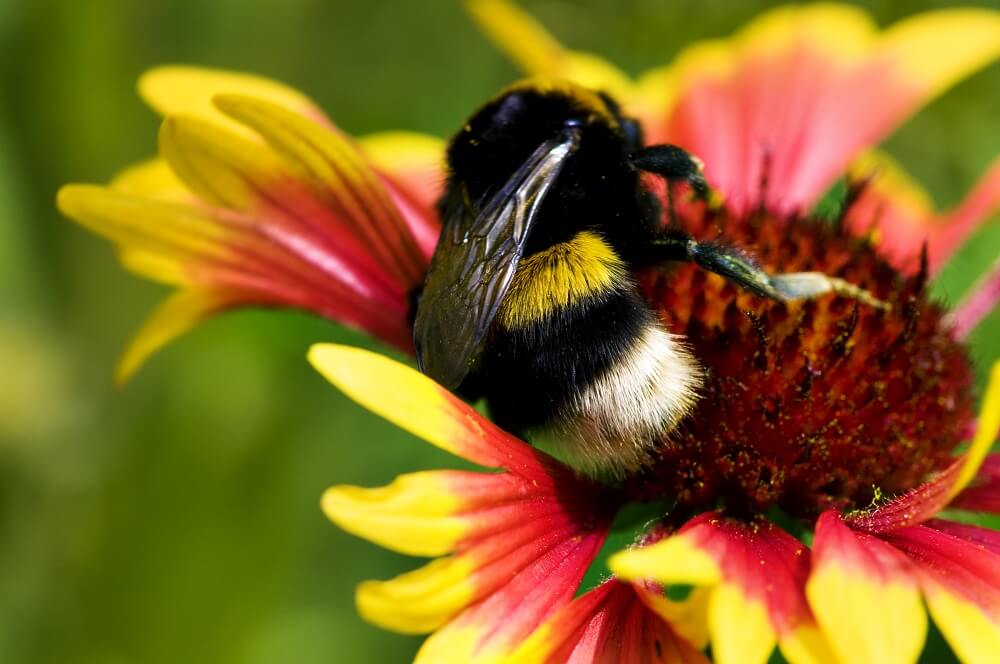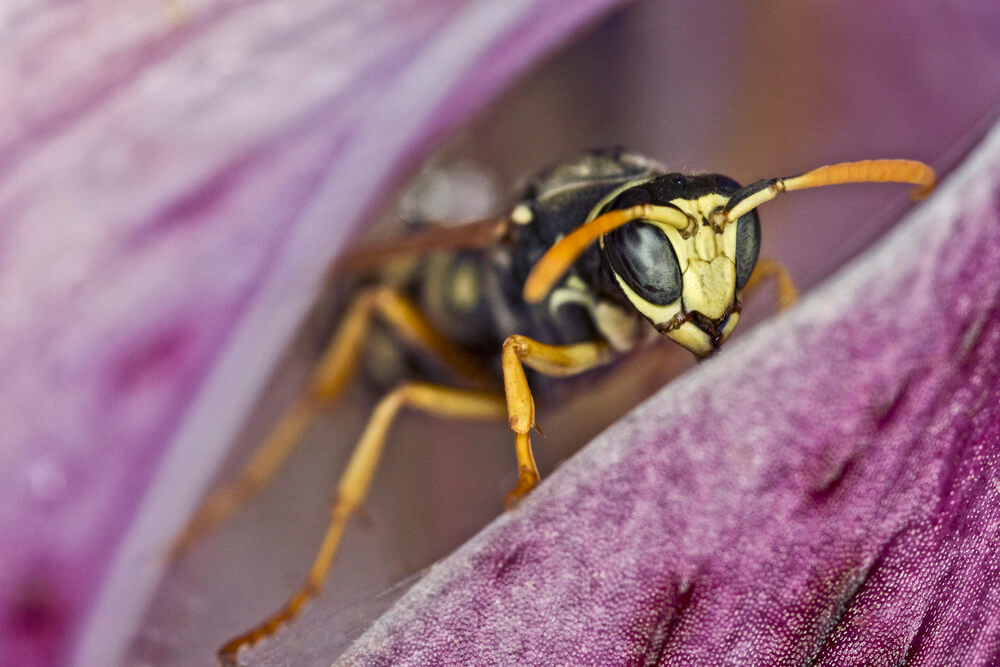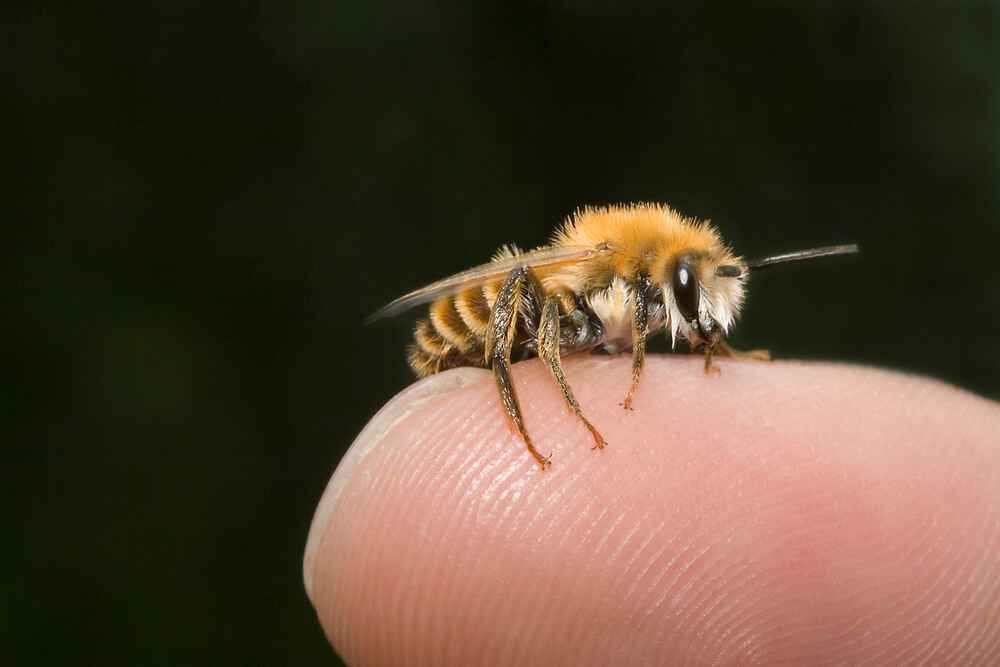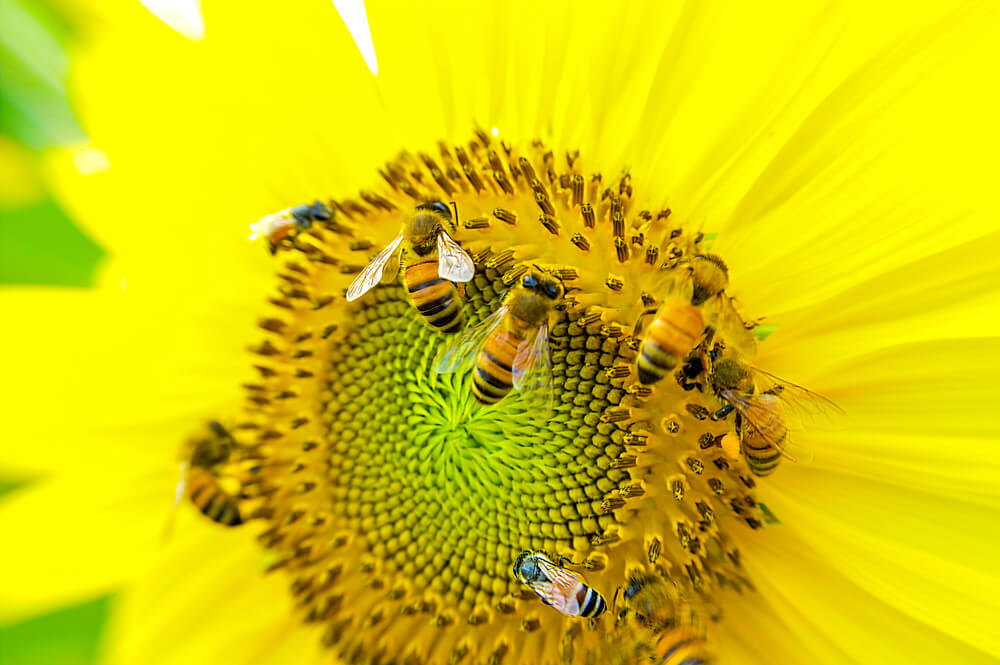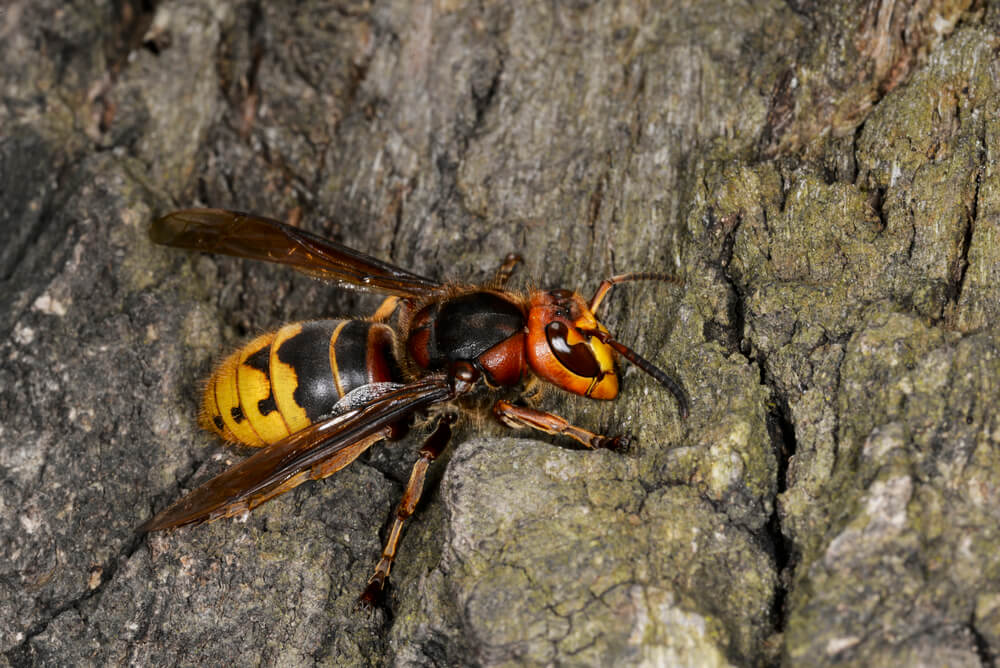In this article:
Do Bumble Bees Sting?
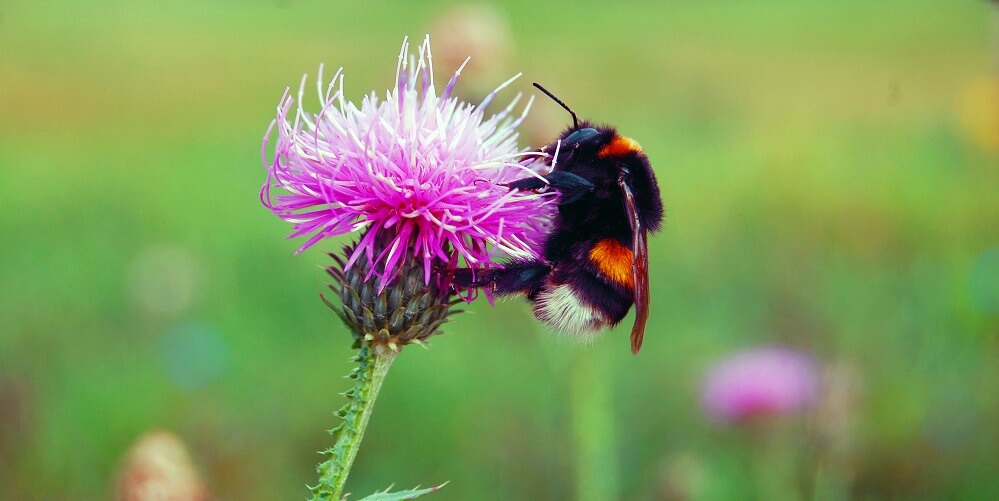
Yes, bumblebees can sting, but it’s rare.
Bumblebees are peaceful creatures. Some people even refer to them as “gentle giants” because of their large size and passive nature.
Bumblebees will only sting when they feel threatened or trapped. In most cases, bumblebees will leave you alone as long as you leave them alone.
But here’s the kicker:
Only female bumblebees can sting. Male bumblebees cannot.
How come, you ask?
Because the stinger is a modified egg-laying device, which is why only female bees have them.
Related: How to Get Rid of Carpenter Bees
What Happens to a Bumblebee After Stinging?
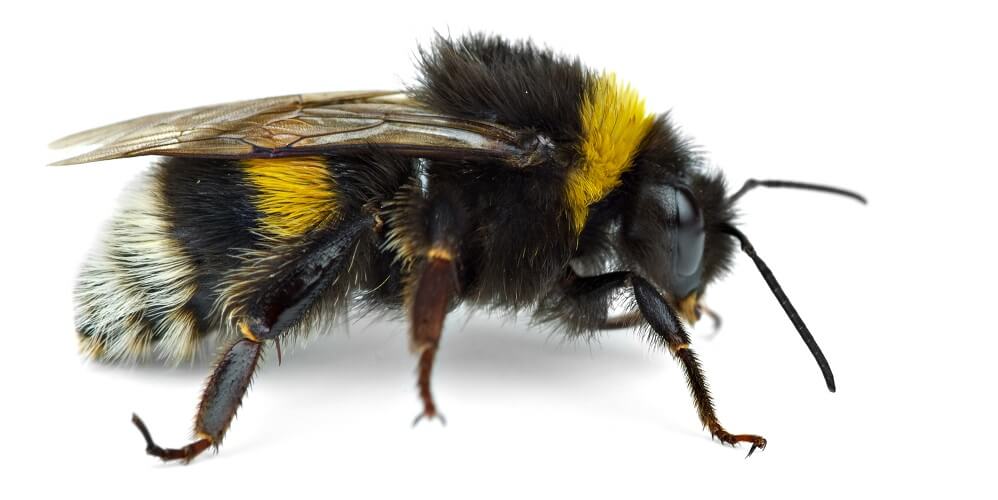
Unlike honeybees, bumblebees don’t die after stinging.
A bumblebees’ stinger has no barbs. This means that their stinger doesn’t get stuck into your skin. Instead, they can safely withdraw their stinger and sting again.
But like mentioned:
Bumblebees rarely sting. They’re peaceful creatures who mind their business when they’re left alone.
On the other hand, honeybees have barbed stingers which get lodged into your skin after stinging. A honeybee’s stinger is attached to important internal organs. These organs essentially get ripped out once the honeybee leaves its stinger in your skin.
If you’d like to learn more about other bee stings, check out our guides: Do Honeybees Sting? and Do Carpenter Bees Sting?
How to Prevent Bumblebee Stings
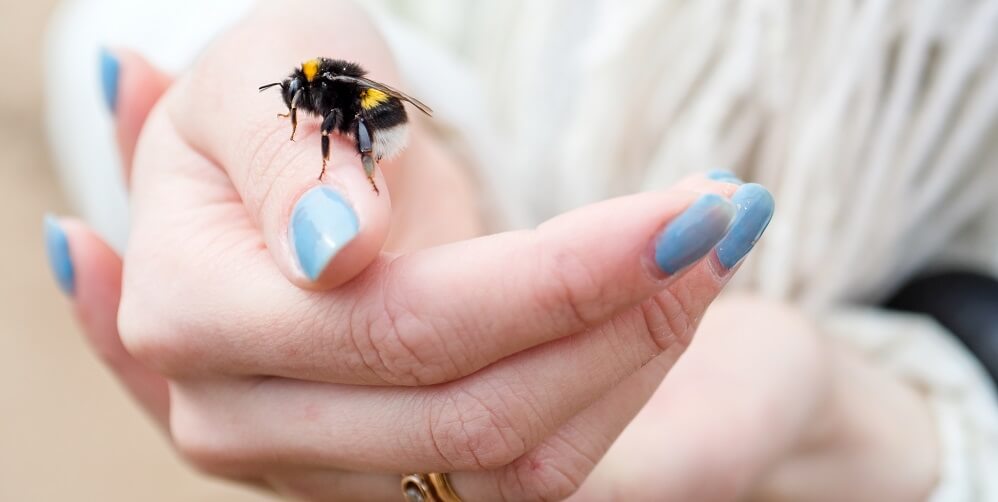
Since bumblebees are so gentle, your odds of getting stung by one are rare.
That said, there are a few tips to reduce the chances even more:
Tip 1: Understand where bumblebees nest
The first step to prevent bumblebee stings is to know where they live so you can avoid their nests.
Bumblebees, like honey bees, live in colonies that provide a safe place to raise their young. Bumblebee nests are usually located underground, particularly in abandoned holes made by other animals.
Some bumblebees choose to nest above ground in abandoned bird nests, hollow logs, or gardens.
Tip 2: Don’t accidentally or purposely provoke them
When dealing with bees, it’s critical to maintain your cool. Don’t flail your arms at the bees, touch their hive or nests, or try to pet the bees.
Also, keep in mind that bumblebees can be defensive to odors such as alcohol, perspiration, and perfumes.
They’re also wary of dark colors such as black, dark gray, and brown. This is because many of the bees’ natural predators are dark in color. For example, spiders, badgers, and birds will feast on bumblebees.
Tip 3: If one lands on you, remain calm
Gently sweep the bumblebee off your body and remove yourself from the area. Be careful not to crush the bumblebee since they’re crucial pollinators that are in decline.
Additional tips for avoiding bee stings:
- When drinking sweet beverages outside, be cautious that bees could fly in them. The best option may be large, open glasses since you can check to see whether a bee is in them. Before consuming from cans or straws, inspect them carefully.
- Cover food containers and trash cans tightly.
- Remove garbage or fallen fruit from your yard (bees might be attracted)
- When walking outside, wear closed-toe shoes.
- Don’t wear baggy clothing, which can trap bees between the cloth and your skin.
- Keep your windows up when you’re driving.
- When mowing the lawn or trimming plants, be cautious for any signs that bees, wasps, or other insects may have been disturbed.
- Have hives and nests near your home handled or moved by a beekeeper if necessary
How to Treat Bumblebee Stings

A bumblebee sting typically produces a non-allergic reaction: swelling, itching, and redness at the sting site. This reaction might last a few hours.
But the good news?
Most bumble bee sting treatments can be done at home.
In certain cases, some precautions may be taken to minimize the reaction. This is especially true when a person has been stung in a sensitive region such as around the eyes or mouth.
You might try an anti-inflammatory (such as aspirin or ibuprofen) and apply a cold compress to the sting site as soon as possible. In addition, many anti-itch creams and lotions are available to help relieve symptoms.(1, 2, 3)

There are also home remedies you can try to soothe the symptoms, including applying one of the following to the sting site:
- Honey
- Aloe vera gel
- Calamine lotion
- Ice
But now the question becomes:
How do I handle a severe reaction to a bumblebee sting?
A severe allergy (anaphylaxis) to bee stings can be fatal and must be treated immediately. Anaphylaxis can develop in a small proportion of individuals who are stung by a bee.
The following are signs and symptoms of anaphylaxis:
- Skin reactions, such as hives and itching, as well as flushed or pale skin.
- Problems breathing
- Throat and tongue swelling
- A fast pulse
- Nausea, vomiting, or diarrhea
- Fainting or dizziness
People with severe allergies to bee stings are more likely to develop anaphylactic shock the next time they’re stung. In this case, speak with your doctor or an allergy expert about immunotherapy (“allergy injections”) as a preventative measure.(4, 5)
If you’ve been stung and are experiencing any of the following severe reactions, please call 911 or other emergency services immediately: even if it’s just one or two symptoms.
If you were given an emergency epinephrine autoinjector (EpiPen, Auvi-Q, others), use it right away as directed by your doctor.
Also, seek immediate medical attention if you’ve been swarmed by bees and have numerous stings.
And finally?
Make an appointment to see your doctor if:
- The bee sting symptoms don’t fade in a few days.
- You’ve had other signs of an allergic reaction to a bee sting, such as hives or swelling.
FAQs about “Do bumble bees sting?”
- Do bumble bees sting or bite?
- Do bumble bee stings hurt?
- Is a bumblebee sting worse than a honey bee sting?
- Do bumble bees die after stinging you?
- Can you pet a bumblebee?
- Do bumble bees sting dogs?
- Do bumble bees sting cats?
- Do queen bumble bees sting?
- Do bumble bees chase you?
- What hurts more, wasp or bee stings?
- How do bumblebees warn you?
- Do male bumble bees sting?
Do bumble bees sting or bite?
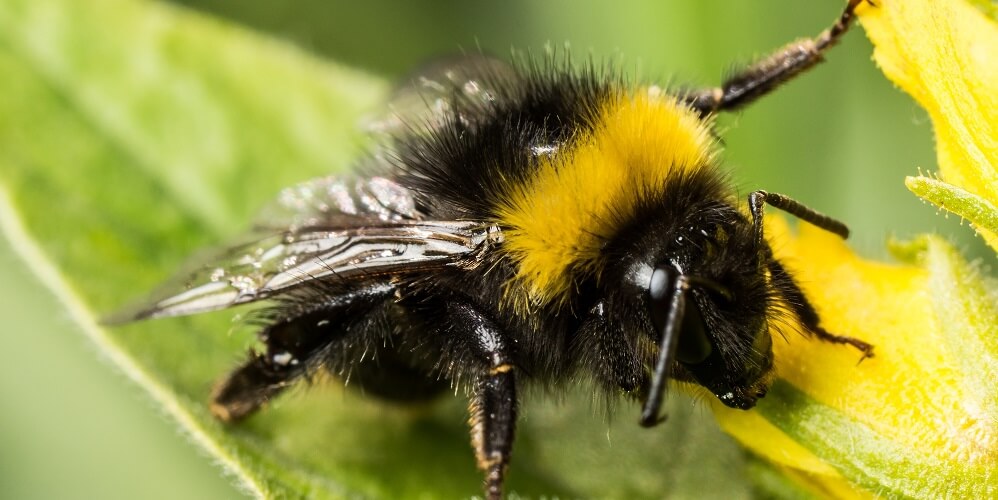
Don’t worry; bumblebees won’t bite you. Instead, they use their mouth to collect nectar and clean their nests.
Bumblebees have the ability to sting, but they only do so as a last resort if they feel threatened, which is rarely the case if you leave their nests alone.
—> Go back to the “Do bumble bees sting?” FAQs
More to Explore:
Do bumble bee stings hurt?
Fortunately, bumblebees are not known for stinging, and, even if they do, the sting isn’t usually as painful as wasp or honeybee stings.
If you’re stung, stay calm, clean the area, and you should be fine. Although severe allergic reactions are uncommon, if they do happen, you should seek medical attention.
—> Go back to the “Do bumble bees sting?” FAQs
More to Explore:
Is a bumblebee sting worse than a honey bee sting?
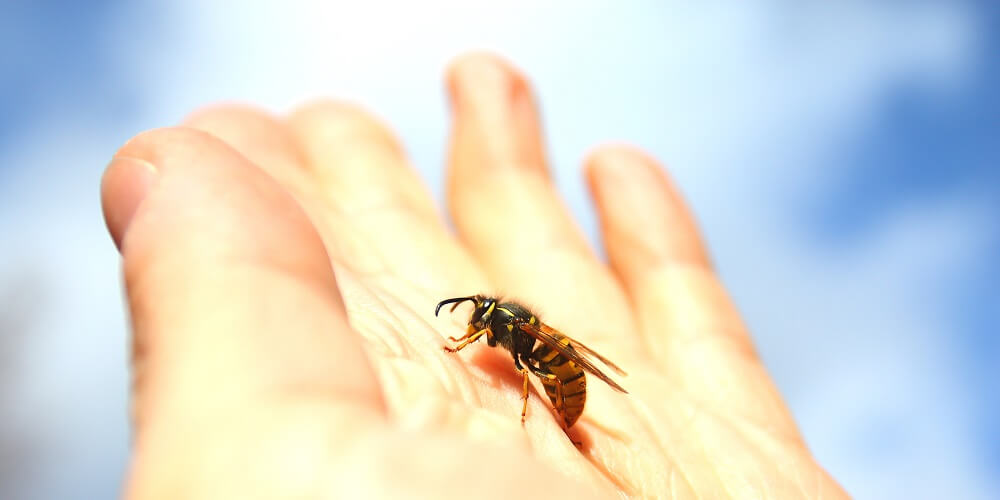
Some people say that a bumblebee sting feels less painful than that of a wasp or honey bee.
However, if the sting occurs on the head and neck, or if you’re severely allergic to bee stings, it can be more painful and serious. Bumblebees can sting multiple times, but they’re far less likely to do so than hornets, yellow jackets, or honey bees.
That said, bumble bees and honey bees have many things in common. Read our popular article, “Do bumble bees make honey?” for more information.
—> Go back to the “Do bumble bees sting?” FAQs
More to Explore:
Do bumble bees die after stinging you?
This is a common question we get, along with:
Does a bumble bees sting kill them? Can bumble bees sting more than once?
Bumblebees have smooth stingers and can sting numerous times without dying. Fortunately, they’re gentle bees.
Stinging is usually deadly for honey bees. This is due to the fact that honey bees, unlike other species, have barbed stingers. The honeybee’s stinger becomes hooked into human skin, injuring the bee when it flies away.
—> Go back to the “Do bumble bees sting?” FAQs
More to Explore:
Can you pet a bumblebee?
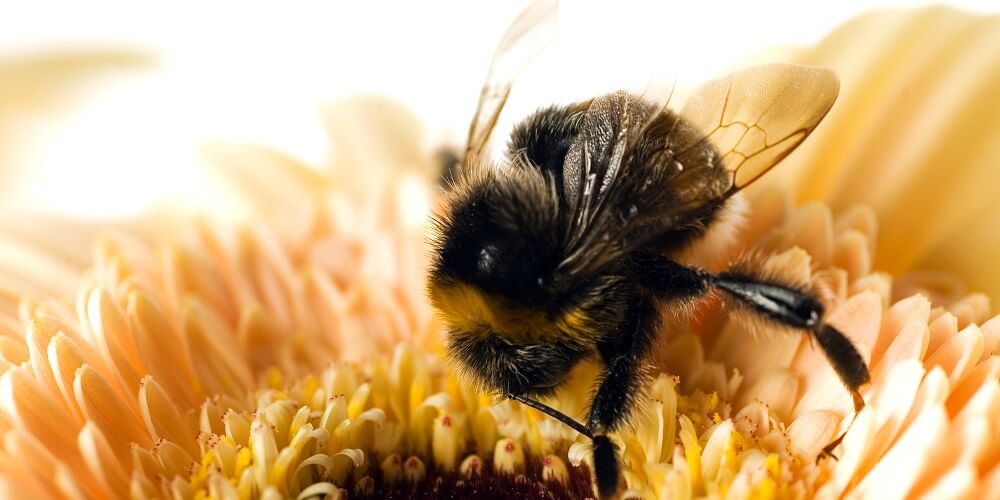
It’s not a good idea to pet bumblebees. You should give them their space and respect them, or they may become scared and sting you if you don’t do so.
—> Go back to the “Do bumble bees sting?” FAQs
More to Explore:
- How Long Do Bumble Bees Live?
- Why Do Vulture Bees Eat Rotting Flesh?
- How Many Wings Does a Bee Have?
Do bumble bees sting dogs?h

If a bumblebee feels threatened, it may sting your dog. It’s also possible that dogs could eat and ingest flying bees, especially if their mouths are open while playing or chasing.
This is why it’s a good idea to be familiar with bee colonies and hives in your backyard or places where your dog likes to hang out.
Now you might be wondering:
Well, what happens if a bumblebee stings my dog?
First, it depends on where the bee stings. For dogs, the most common bee stings occur in the mouth or on the nose.
You should determine whether your dog ingested a bee first. Examine their snouts and lips for stings. Examine the inside of their mouths, particularly the gums, tongue, and back of the throat.
Remove any stinger if your dog gets stung (only honeybees leave stingers). Don’t try to pull the stinger out by pinching it – this will just push more venom into your dog. Instead, place a credit card against the skin and slide it in one direction to extract the stinger.
The good news is that bee stings are venomous, not poisonous. As a result, even though the bee’s sting may irritate your dog, you won’t have to worry about your dog poisoning himself by eating it.
In most cases, your dog will be fine and symptoms will alleviate in a few hours.
That said, if you notice swelling or if your dog appears to be in pain, contact your veterinarian as soon as possible.
—> Go back to the “Do bumble bees sting?” FAQs
More to Explore:
Do bumble bees sting cats?
Like with dogs, bumblebees can also sting cats if they feel threatened.
If your cat gets stung, it’s very probable that he or she will have a swollen paw or face, which are the most typical sites for cats to be stung. The majority of the time, bee stings in cats are not a big deal.
That said, if your cat has been stung several times or appears to be having a reaction of any kind, you should visit a veterinarian immediately.
As always, be on the lookout for bee, wasp, or hornet nests in your area. Cats are highly persistent creatures, and it’s difficult to distract them once they’ve entered hunter mode.
If you spot wasp or bee nests in your yard, get expert help relocating them. You shouldn’t try this yourself.
—> Go back to the “Do bumble bees sting?” FAQs
More to Explore:
Do queen bumble bees sting?
Yes, they can. But, getting stung by a queen bee is rare because she has worker bees that help protect her instead. A queen bumblebee’s role is to find a new home for her workers and lay eggs to populate the colony.
A queen bee typically only uses her stinger to repel other queen bees.
—> Go back to the “Do bumble bees sting?” FAQs
More to Explore:
Do bumble bees chase you?

Yes, they can if they feel their nest is in danger. Bumblebees will chase nest intruders for a long distance to deter them away from their homes.
—> Go back to the “Do bumble bees sting?” FAQs
More to Explore:
What hurts more, wasp or bee stings?
The bumblebee sting vs. wasp scenario is a common one.
The answer?
It depends because everyone has a different opinion.
But, most people say that wasp stings are typically a bit more painful than honey bee stings. And to take it a step further, hornet stings typically hurt more than bee or wasp stings.
Why?
Because the hornet is much larger, with a stinger that is considerably thicker and longer. The sting also lacks hooks, which makes it possible for the hornet to sting someone numerous times.
Bee and wasp stings are smaller and don’t go as deep into the skin. That doesn’t imply, however, that bee and wasp stings are pleasant.
—> Go back to the “Do bumble bees sting?” FAQs
More to Explore:
How do bumblebees warn you?
When a bumblebee feels threatened away from its nest, it’ll exhibit a variety of signals that tell you to back off.
The two most common signals are raising their legs and moving their stinger towards you.
Here’s a video of a bumblebee displaying these warning signs to a person’s finger:
—> Go back to the “Do bumble bees sting?” FAQs
More to Explore:
- How to Keep Bees Away From Hummingbird Feeders
- How to Get Rid of Carpenter Bees
- Wasps vs. Honeybees: How Do They Compare?
Do male bumble bees sting?
No, male bumblebees don’t have stingers so they can’t sting you. Only female and queen bees have stingers.
